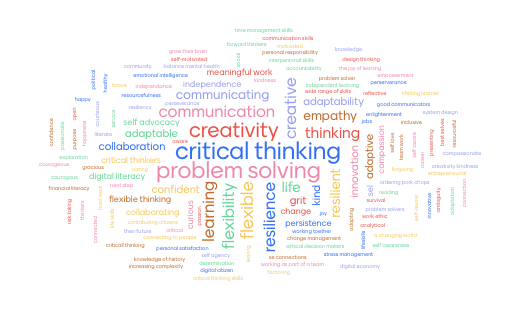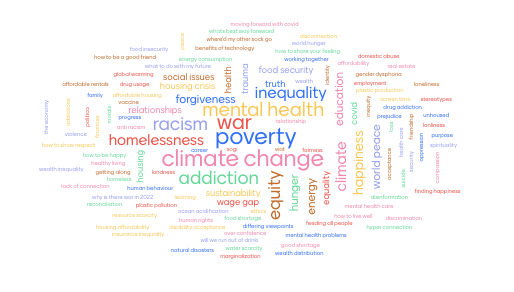I had a really great time at the #DLsymp22 conference this week. It was my first time back face 2 face, and while i had a few butterflies before I walked up on stage, it all felt pretty natural. I had forgotten how much fun it was to be with a few hundred passionate educators where the things that I care about are the things that they care about. Good times.
Uncertainty
The talk I gave was the first run of the stuff I’ve been working on for the last two years. I started writing a book in the summer of 2019 that became, eventually, about uncertainty and its relationship to learning. A book, that, frankly, needed to get rewritten a few times considering how the people’s sense of ‘uncertainty’ was impacted by the last few years.
I framed the talk around the needs of the young people coming out of our education system. What do they need to learn ‘for’. I’ve had the opportunity to spend a lot of time around 20ish year olds the past couple of years (I’ve had 70 Co-op students work with me) And their plight, and the way I believe they’ve been misunderstood has become a real focus of my time. What are they facing and what do we need to do to help them face it? What does our education system need to ‘be’ to get them there?
The first question I asked the crowd was what they thought students were learning for…

It’s a great chart, with lots of words that I think are super-important in the process of helping students get ready for what they are going to be facing going forward.
The middle part of the talk was about how I have this suspicion that our education system contributes to a particular ‘syndrome’ that is quite the opposite of what you see in that wonderful list of things to learn. Quaintly named, I’ll admit. But I’m calling a hat a hat on this one… to avoid confusion.

I have consistently struggled with student employees, early on in their work term, with assuming that any problem I give them – or questions I ask them -has a clear answer. That they can get their job ‘right’. Maybe more importantly, many (most?) seem to believe that I actually already know the answer to any question I ask them… like I’m playing some kind of game by not telling them the answer.
Like they are still playing the game of school. The game where a teacher has something they want you to do, they know what the ‘answer’ is, but they just won’t tell you. Good, compliant, high achieving students, are the ones who figure out what the teacher wants and gives it to them. They are rewarded for learning compliance. (note: compliance is not on the list of things we say we want them to learn, and yet it is often what we reward most.)
The next question (further into the talk) that I asked was about what they thought students would be facing. This was not the cheeriest part of the talk. We are living through a time right now where at least 4 things I would have considered black swans (war in Europe, oil prices, climate change, pandemic) in 2010 are happening at the same time. If you include things like housing prices, that number goes up.
I asked the ‘future of our learners’ question through the lens of uncertainty. I defined uncertainty through the lens of the ‘ill-structured problems’ or, kind of, the lens of wicked problems. A problem where one some or all of the question, the process for addressing the question or the solution are unknown or unknowable. The list is pretty scary.

So many of these real world issues are and will remain uncertain. There’s no ‘solution’ to poverty. There’s only hard work on pieces of the problem, a problem that gets super messy to define if you start to think about it.
The disconnect
If the world our students are facing is full of uncertain problems, can we prepare them for that with right answers? Obviously I don’t think so. And it’s not even about leaving room for ‘failure’. In order to fail at something, someone else has to know what success is… and sure, I can’t fail to fix my water tap, because it’s still leaking when I’m done. Sure. There are definitely problems we can fix. A lot of the big ones, though, are not things that ‘fix’.
But we need to teach them the basics
People were really nice to me about the presentation. Many, clearly, were just happy to be together in a big group again. Some people pointed out some very important equity issues with including more ‘uncertainty’ in our teaching. One teacher asked if adding more uncertainty would lead to more anxiety in students or less, because they’d have more practice with uncertainty. Awesome question.
One gentlemen (quite jovially) accosted me later that day and said “but, obviously, we have to teach the basics! They can’t be involved in this if we don’t teach the basics first!”
I should be better prepared for this objection… I’ve been hearing it for 15 years. At least. But it always sets me back a bit. I’m not suggesting that students should have to learn to identify letters or colours. But i don’t really think the ‘basics’ should be the ‘point’ of learning in most cases.
I think of my journey through carpentry… is hammering a basic? Is it drilling? What about joinery?
I’m not saying any of those things aren’t important, but I’ve learned them in the context of building things, of understanding what they’re useful for, not by hammering 1000 nails into a board so the nail head was perfectly flat.
I’m sure my hammering would be BETTER if i did the 1000 nails thing. But there’s more to hammering a nail than getting the nail flat. Safety. wood grain. wood type. time. So many things that bring context to it. Most importantly I’M NOT A CARPENTER. Most of our students will never need to be ‘amazing’ at anything we’re teaching them.
I don’t wish for a world full of super-scientists, I wish for citizens who understand enough about science and statistics to respond ethically to a pandemic. I wish for citizens who can handle uncertainty and still make good decisions.
Insightful.
I think, in a way, it is about leaving room for ‘failure’. Except, what people regard as ‘failure’ is actually just a different type of success.
Yes, you might not complete (in my students’ case) the (computer) program, with all the requirements met, but you have done these key parts. That is a good thing, and something to build on later. Oh, you didn’t do any of it because you thought the whole thing looked scary? Well, it would have been better to try, but at least you are in a position to learn that – to learn that taking small bites out of the problem, and then seeing what your new roadmap looks like would be a success in and of itself.
I wonder if there isn’t more nuance than that though, Pat? I’m the mother of two incredibly intelligent young twenty-somethings who understand TOO well and TOO deeply these huge real-world problems. It’s created such deep-seated and paralyzing despair that they really don’t feel like taking small bites IS a type of success, but rather just another spin of the hamster wheel. It’s termed “existential depression” (which you can read more about here: https://www.davidsongifted.org/gifted-blog/dabrowskis-theory-and-existential-depression-in-gifted-children-and-adults/) and which is far more common than one would imagine.
What Dave brings to the table is a very functional, real world acknowledgement of the depth of uncertainty faced by this generation (or truly by ALL generations currently living) and the means to practical mitigation strategies on a case-by-case basis. Dave is willing, like few others, to not just yell to the emperor that she wears no clothes, but step into the more important challenge of how to get the emporer to dress herself!